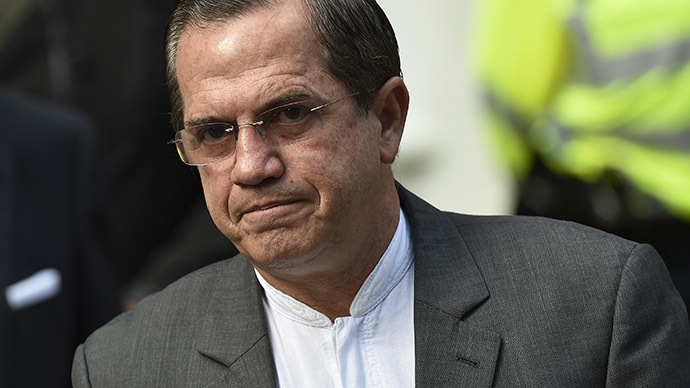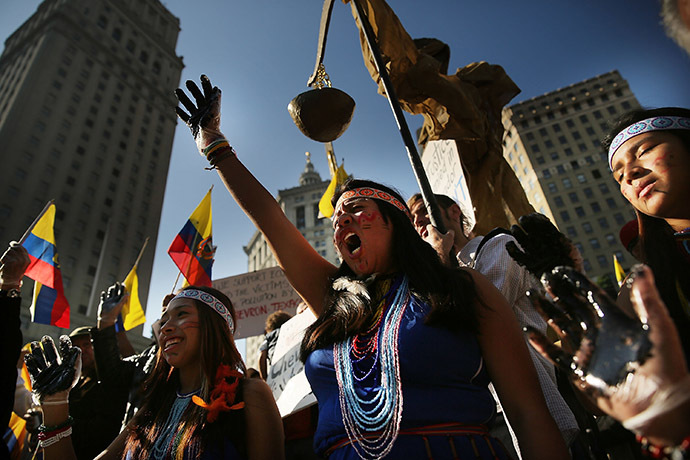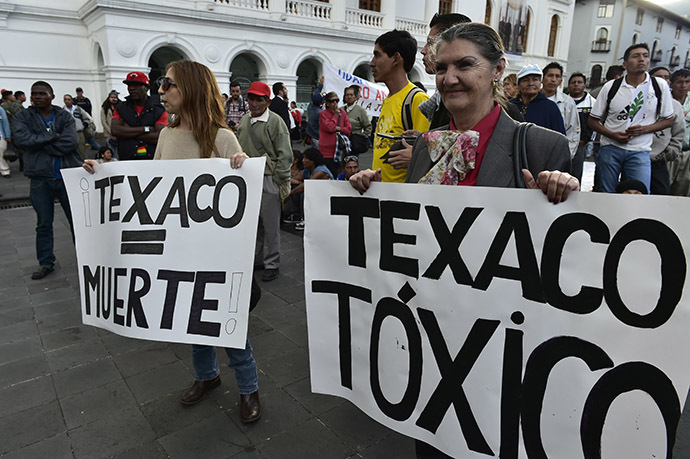Ecuador’s FM Patino on global corporations: Transnational misconduct must end

Transnational corporations have abused their privileges leading to “an unprecedented level of social and environmental injustice,” said Ecuador’s FM Ricardo Patino in his article calling on all nations to hold such companies accountable for their actions:
Ecuador has undergone a profound social, economic and political transformation over the past seven years, prioritizing the needs and rights of its citizens.
A great moral challenge of the 21st century is to establish people’s control over the forces that reign supreme in trade and commerce. Transnational corporations enjoy special rights, protections, and privileges that have led to an unprecedented level of social and environmental injustice, particularly in developing countries without sufficient legal recourse to defend against corporate power. A new proposal spearheaded by Ecuador and South Africa to create a legally binding instrument to regulate the human and environmental rights abuses of transnational corporations, recently approved by the UN Human Rights Council (UNHRC) in Geneva, is the start of setting things right.
The global proliferation of Bilateral Investment Protection Treaties has granted transnational corporations extensive and ever-expanding investor rights and protections at the expense of the rights of the people and environment where they operate. Some of these agreements have enabled corporations to sue the government of South Africa for empowering citizens affected by apartheid, the government of Germany for phasing out nuclear energy, and the governments of Uruguay and Australia for requiring health warnings on cigarette packages.
It is detrimental to our nations that today no international legal basis requiring multinational corporations to respect and abide by human and environmental rights standards exists. Until now, businesses had only the voluntary, non-binding “Guiding Principles of the United Nations on Business and Human Rights”, endorsed only recently by the UNHRC and UN General Assembly.

The plight of victims of environmental violence at the hands of transnational corporations, such as that by Union Carbide in Bhopal, Shell in the Niger Delta, and Chevron-Texaco in Ecuador, demonstrate just how dangerous this legal gap is. All of the victims in these cases and others are still waiting for remedy and fair compensation.
The massive damage caused by Texaco in the Lago Agrio area of the Amazon rainforest is well known, and is still evident in the form of ubiquitous black pools of toxic sludge twenty years after the oil company formally left our country. Despite losing a court case in Ecuador raised by affected indigenous communities, Chevron (which acquired Texaco in 2000) is illegally and illegitimately using an international arbitration system to avoid complying with the judicial sentence in Ecuador.
Chevron’s suit relies on a Bilateral Investment Treaty between Ecuador and the US, which entered into force in 1997. But Texaco closed its operations in Ecuador back in 1992, before a treaty ever existed. Despite this fact, The Hague arbitration panel, comprised of three lawyers, deemed itself competent to review the matter, and then urged our government to halt the decision of the Ecuadorian court, disregarding that the judiciary is independent of the executive branch in our democratic nation.
This is but one example of how international trade and investment agreements place transnational corporations above sovereign national law, allowing them to use their money, influence and lobby groups to escape accountability for their actions.
The necessity of ensuring legal protection of investment should not allow multinational corporations to abuse entire nations and their populations. Existing international courts of arbitration permit any multinational company to sue a sovereign state, bypassing a national court. Studies have shown how a majority of these arbitrators side with corporate interests over the protection and promotion of human rights, and universal principles of law.

We propose to fix this unjust situation with a new legal instrument approved for development by the UNHRC in June. These new regulations would move the world to a legal framework that holds transnational corporations accountable for their human rights violations. It will provide legal protections and effective remedies, as well as create an important role for civil society actors in promoting corporate accountability and in preventing and mitigating adverse human rights impacts of transnational corporations.
Ecuador alone is not going to change this unfair world order. But we are taking a first step, together with South Africa and many other nations that have supported our initiative to make corporations accountable for abusive actions. Outside the structure of the United Nations, we have already advanced in the creation of an Observatory of the South on Investments and Transnationals to monitor litigations corporations have against nations and ensure state sovereignty is respected. This watchdog effort includes the participation of Latin American, Caribbean, Asian, Arab and African nations.
Citizens of developed countries will also join forces to support those of us directly affected by the misconduct of some multinationals, once they realize that they are also victims of the supremacy of capital. Today we have the collective duty to protect our people and our environment. It’s time to reign in the arbitrary actions of corporate power and create the conditions for a more just and respectful world.
By Ricardo Patiño
Minister of Foreign Affairs of Ecuador
The statements, views and opinions expressed in this column are solely those of the author and do not necessarily represent those of RT.












